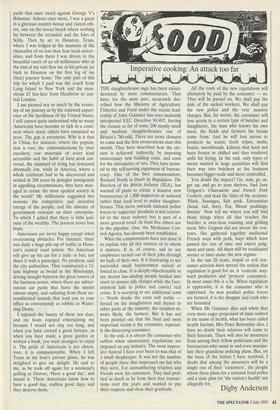Imperative cooking: An attack too far
THE slaughterhouse saga has been misun- derstood by most commentators. They have, for the most part, accurately des- cribed how the Ministry of Agriculture, Fisheries and Food under the recent lead- ership of John Gummer has over-zealously interpreted EEC Directive 91/497, forcing the closure so far of some 200 mostly small and medium slaughterhouses out of Britain's 780-odd. There are more closures to come and the first prosecutions start this month. They have described how the clo- sure is achieved: indirectly, by imposing unnecessary new building costs, and costs for the attendance of vets. They have point- ed to the self-serving expansion of bureau- cracy. One of the best commentators, Richard North in Death by Regulation: The Butchery of the British Industry (IEA), has warned of plans to create a massive new bureaucracy of 1,800 inspectors at national rather than local level to police slaughter- houses. This move towards national police forces to 'supervise' products is not restrict- ed to the meat industry but is part of a more general trend. At least five others are in the pipeline. One, the Medicines Con- trol Agency, has already been established.
What the commentators have not done is to explain why all this matters or to whom it matters. It is, of course, sad to see employees turned out of their jobs through no fault of their own. It is frustrating to see successful small businessmen ruined or forced to close. It is deeply objectionable to see decent law-abiding people herded into court to answer silly charges while the Gov- ernment fails to police and convict real crime. It is worrying to see additional costs — North thinks the costs will treble — forced on the slaughterers and thence to other parts of the industry, the retailers or, more likely, the farmers. But it has not been pointed out that the final and most important victim is the consumer, especial- ly the discerning consumer.
In the end, it is always the consumer who suffers when unnecessary regulations are imposed on any industry. The most impres- sive funeral I have ever been to was that of a small shopkeeper. It was not the number of people there that impressed me but who they were. For outnumbering relatives and friends were his customers. They had prof- ited as much as he from their free transac- tions over the years and wanted to pay their respects and show their gratitude. All the costs of the new regulations will ultimately be paid by the consumer — us. They will be passed on. We shall pay the dole of the sacked workers. We shall pay the new police and the vets' massive charges. But, far worse, the consumer will lose access to a certain type of butcher and slaughterer, the man who knows his own meat, the fields and farmers his beasts come from. And he will lose access to products he wants: fresh tripes, melts, brains, sweetbreads, kidneys that have not been frozen or chilled and thus rendered unfit for frying. In the end, only types of meats wanted in large quantities will find their way into butchers as the business becomes bigger-scale and more controlled.
You doubt the impact? Go, now, go on, get up, and go to your shelves, find Jane Grigson's Charcuterie and French Pork Cookery, and read the titles of the sections: 'Pâtés, Sausages, Salt pork, Extremities (head, tail, feet), Fat, Blood puddings, Insides'. Now tell me where you will find those things when all that reaches the butcher is over-lean roasting and grilling meat. Mrs Grigson did not invent the con- tents. She gathered together traditional French ways with pork, ways which have passed the test of time and expert judg- ment and taste. All these will be eradicated sooner or later under the new regime.
In the last 20 years, stupid or evil con- sumer activists have spread the notion that regulation is good for us, it 'controls' way- ward producers and 'protects' consumers. In most cases this is a lie. When regulation is oppressive, it is the consumer who is oppressed. As new product police forces are formed, it is the shopper and cook who are hounded.
When Mr Gummer dies and when that even more eager proponent of state control in the name of health, what has been called health fascism, Mrs Peter Bottomley dies, I have no doubt their relatives will come to their funerals. There will also be mourners from among their fellow politicians and the bureaucrats who assist in and even manipu- late their grandiose policing plans. But, on the basis of the letters I have received, I doubt that among the mourners will be a single one of their 'customers', the people whom these plans for a national food police and a state plan for 'the nation's health' are


















































 Previous page
Previous page